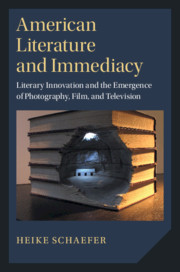 American Literature and Immediacy
American Literature and Immediacy Book contents
- American Literature and Immediacy
- Cambridge Studies in American Literature and Culture
- American Literature and Immediacy
- Copyright page
- Dedication
- Contents
- Acknowledgements
- The Quest for Immediacy in American Literature and Media Culture
- Part I Literary Immediacy and Photography
- Chapter 1 The Poet as “Exact Reporter of the Essential Law”: Ralph Waldo Emerson’s Poetics in the Context of Early Photography
- Chapter 2 “To Exalt the Present and the Real”: Walt Whitman’s Photographic Poetry
- Chapter 3 The Politics of Paying Attention: The Romantic Desire for Immediacy
- Part II Literary Immediacy and the Cinema
- Part III Literary Immediacy and Television
- Notes
- Bibliography
- Index
- Series page
Chapter 1 - The Poet as “Exact Reporter of the Essential Law”: Ralph Waldo Emerson’s Poetics in the Context of Early Photography
from Part I - Literary Immediacy and Photography
Published online by Cambridge University Press: 19 December 2019
- American Literature and Immediacy
- Cambridge Studies in American Literature and Culture
- American Literature and Immediacy
- Copyright page
- Dedication
- Contents
- Acknowledgements
- The Quest for Immediacy in American Literature and Media Culture
- Part I Literary Immediacy and Photography
- Chapter 1 The Poet as “Exact Reporter of the Essential Law”: Ralph Waldo Emerson’s Poetics in the Context of Early Photography
- Chapter 2 “To Exalt the Present and the Real”: Walt Whitman’s Photographic Poetry
- Chapter 3 The Politics of Paying Attention: The Romantic Desire for Immediacy
- Part II Literary Immediacy and the Cinema
- Part III Literary Immediacy and Television
- Notes
- Bibliography
- Index
- Series page
Summary
The chapter shows that Emerson and Whitman refined their poetics by probing the truth claims and reality effects of photography. It expands our understanding of American romantic literature by connecting the romantic concern with intuition, firsthand experience, and organic expression to the emergence of photography. Claims to authenticity and immediacy were central to the reform efforts of the transcendentalists because they enabled them to resist social conventions, to counter the commercialization of literary culture, and to renew literature’s democratic ethos. The chapter identifies photographic discourse as an important testing ground for this orientation. Emerson repeatedly reflected on photography to think through the relations between knowledge and mediation and to define the cultural role of literature. At first, he held that the camera’s capacity to record optical reality without distortion realized his ideal of intuitive insight and original expression. His attitude towards photography grew more ambivalent, however, as his commitment to a poetics of process deepened. Seeking to represent a world in flux, Emerson grew wary of photography’s stabilized records of reality.
Keywords
- Type
- Chapter
- Information
- American Literature and ImmediacyLiterary Innovation and the Emergence of Photography, Film, and Television, pp. 31 - 68Publisher: Cambridge University PressPrint publication year: 2020


